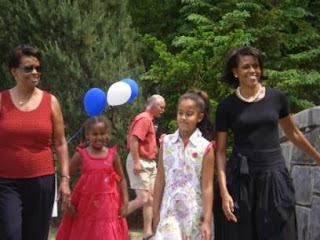And last night Obama gave a speech that was a rhetorical tour-de-force.

He spoke to over 75,000 people in the stadium and millions upon millions around not only the U.S. but around the world. And what dawned on me as I once again had tears in my eyes, was how incredible it was for Obama, his family, his supporters, the Democratic party, and OUR NATION to get to this point.
THIS is The Great Impossible Feat. What is "THIS"? There's so many things in "THIS":
*Obama's rise from delivering a rousing and inspiring speech at the 2004 DNC where he hadn't yet even been elected to the U.S. senate to four years later accepting the nomination for president in 2008.
*Obama's background: his mixed-race background, his working-class background, his childhood in Hawaii and Indonesia, his extended family in the U.S. and in Kenya (and around the globe), and the choices he has made in his professional and personal life.
*Obama as our first non-white, first African American candidate for a major party. Again, in terms of "history," 45 years ago people marched on Washington to shed light on the need for Civil Rights. Segregation and institutional racism was rampant. The idea that we would have an African American president was something found in Science Fiction and not The New York Times. The idea that the image below would and in fact *COULD* be our first family was unfathomable. And yet...45 years later, here they are:

*Finally, what "THIS" is, is a sea change. It's large numbers of people, mass numbers of people, getting involved in politics FOR THE FIRST TIME. On a personal note, for the first time I got involved in a presidential race in my own very small, very minor way, by knocking on doors and registering people to vote. Others have been much more active and vocal than I have, but what we all share is a desire to get involved in the political process because we are inspired to do so. Whether that inspiration comes out of fear and anxiety that we do NOT want more Republican mis-leadership or whether it's from the inspiration of Barack Obama and his platform, the simple truth is that people are TRYING to make a DIFFERENCE this election. People are getting involved and showing up and doing something as basic as registering people to vote and talking candidly and with conviction about why they are supporting Obama and why we want to take the country in a direction that is positive and progressive.

And THIS is T.G.I.F.: The Great Impossible Feat. That people are trying to make a difference, are taking seriously the rhetoric that what is supposed to make our country "great," that distinguishes our government as a "democracy" from other forms of government, is that people, average citizens, can take part in the election process. Even if it is as simple as casting a ballot. But sometimes it's the simplest acts that are also the greatest ones.


























